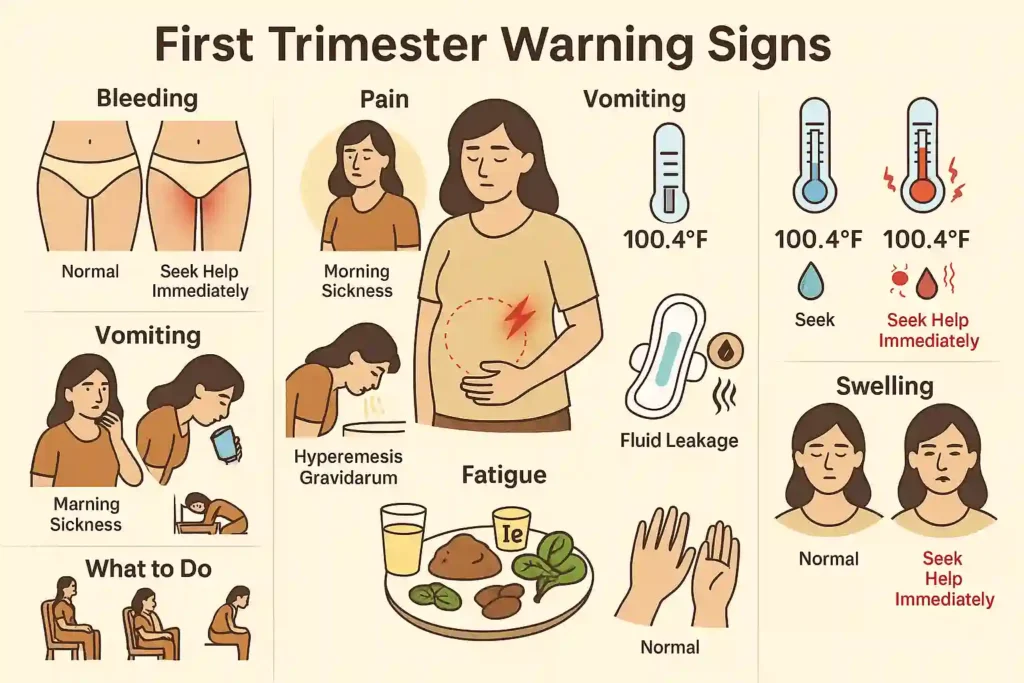Pregnancy is a beautiful and emotional time, especially in the early months. But it’s also a phase when many mothers feel confused — what’s normal and what isn’t? Your body is changing fast, and while most of these changes are natural, some could signal a problem. That’s why it’s important to understand first trimester warning signs.
In this guide, I’ll walk you through 10 important signs you should never ignore. You’ll also find practical self-care tips that can help while you wait to consult your doctor.
Table of Contents
ToggleIs Bleeding or Spotting in Pregnancy Normal?
Some women experience light spotting in early pregnancy. This could be due to implantation, which usually happens around the time your period would have been due. The spotting is typically light brown or pink in color and doesn’t last long.
However, if you notice heavy bleeding — the kind that soaks through a pad in an hour — or if the blood is bright red and accompanied by severe cramping, it could be a warning sign. This kind of bleeding may indicate a miscarriage or other serious issue.
If this happens, stay calm and rest. Lying on your left side may improve blood flow to the baby. Drinking water or coconut water can help prevent dehydration. However, no home remedy can stop heavy bleeding — immediate medical help is essential.
When Is Stomach Pain a Danger Sign?
It’s common to feel mild cramps or a gentle pulling sensation as your uterus grows. These are usually harmless. But sharp, severe pain — especially if it’s on one side or accompanied by bleeding — should not be ignored.
Severe pain could be a sign of ectopic pregnancy, where the embryo implants outside the uterus. This can be dangerous if not treated on time. Gentle rest at home, a warm compress (not hot), and slow movements may provide slight relief, but don’t wait — see your doctor urgently if the pain is persistent or unbearable.
Is Too Much Vomiting Harmful?
Morning sickness is part of pregnancy for many women. But when nausea turns into nonstop vomiting — when you can’t even keep water down — it can lead to dehydration and weakness. This condition is known as hyperemesis gravidarum.
If you feel faint, your mouth is dry, or you haven’t passed urine in several hours, it’s time to see your doctor. While waiting, you can try sucking on small pieces of ginger, sipping lemon water, or eating dry toast. But if nothing stays down, medical attention is necessary to protect both you and your baby.
What If You Get a High Fever?
Mild fever due to a cold or flu isn’t uncommon. But a temperature over 100.4°F (38°C), especially if it comes with body aches, rash, or foul-smelling discharge, could point to an infection.
At home, you can stay comfortable by sponging yourself with lukewarm water and drinking tulsi tea or ginger tea. Avoid taking any medicines without your doctor’s advice. Fever that doesn’t come down or is accompanied by pain or discharge needs quick medical attention.

Is Dizziness or Fainting in Pregnancy Normal?
Pregnancy can cause mild dizziness, especially if you stand up too fast. But repeated fainting spells, weakness that prevents you from standing, or breathlessness can be signs of low blood pressure, anemia, or low blood sugar.
To feel better, sit or lie down immediately and try sipping sweet lime water or fruit juice. Eating small, frequent meals rich in iron — like dates, spinach, or jaggery — can also help. But if fainting keeps happening, or you feel breathless even at rest, don’t delay seeking medical care.
Can Headaches Be a Danger Sign?
Headaches during pregnancy can be triggered by stress, hunger, or dehydration. These are usually mild and go away with rest. But a sudden, severe headache — especially one that comes with blurred vision or swelling of the hands and face — could signal a serious condition like preeclampsia, even in the first trimester.
Try resting in a quiet, dark room and drinking water to see if the headache eases. Massaging your temples with a drop of lavender or coconut oil may offer relief. But if the pain is intense and comes with vision changes or swelling, see your doctor at once.
What About Fluid Leaking Early in Pregnancy?
A small amount of clear or white discharge is normal. But if you suddenly feel a gush of watery fluid, or if the fluid is yellow, green, or smells bad, it’s not something to ignore. This could mean an infection or an early rupture of the pregnancy sac.
Place a clean pad to observe the color and amount of the fluid and head to your doctor or hospital immediately. No home remedy can stop fluid leakage, but staying calm and noting these details will help your doctor assess the situation.
Is Extreme Tiredness Always Safe?
Feeling more tired than usual is expected in early pregnancy as your body adjusts. But extreme tiredness where you can’t manage simple daily tasks could mean something more — like anemia or thyroid problems.
Eating iron-rich foods, drinking nimbu pani with a pinch of salt and sugar, and taking short rests during the day may help boost energy. But don’t ignore this kind of weakness — get tested to make sure all is well.
Should You Worry About No Pregnancy Symptoms?
Every pregnancy is different. Some women hardly feel symptoms, and that’s normal. But if you suddenly lose all pregnancy symptoms — like nausea or breast tenderness — and this happens before a doctor has confirmed a heartbeat, it could be a cause for concern.
It’s a good idea to note your symptoms and share changes with your doctor. They may suggest a scan to check that everything is progressing well.
When Is Swelling a Concern?
Mild swelling in the feet at the end of a long day is common. But sudden swelling in your hands, face, or feet, especially if it comes with headaches or vision changes, can be a sign of a serious condition and should not be ignored.
Try resting with your feet raised and cutting down on salty foods. Drinking jeera water can also help reduce bloating. But don’t delay medical advice if swelling appears suddenly or with other warning signs.
Final Thoughts
Most pregnancies go smoothly. But knowing about these first trimester warning signs helps you stay prepared. If you notice anything unusual, trust your instincts. It’s always better to call your doctor or visit a hospital — your care team is there to help you and your baby stay safe.
Light spotting—light pink or brown—can be due to implantation or cervical changes. But bright red bleeding, soaking through a pad in an hour, or clots likely need medical attention. It could indicate miscarriage or another issue
Mild cramps are common as the uterus grows. However, sharp, severe cramps, especially on one side or with bleeding, can signal ectopic pregnancy or miscarriage. If pain is intense or persistent, contact your doctor right away .
Frequent nausea is normal, but if you can’t keep fluids down and have dry mouth or dizziness, it could be hyperemesis gravidarum. This may cause dehydration, requiring medical care with IV fluids or medication .
A fever above 100.4°F (38°C) could signal an infection—like UTI or flu—which may be risky for pregnancy. If it comes with chills, rash, or burning urine, see a doctor .
Occasional lightheadedness is common. But repeated fainting, weakness, or breathlessness may suggest anemia or low blood pressure. When accompanied by severe headaches or chest pain, get medical attention .
A mild headache is usually fine, but a sudden, intense headache—especially with vision changes or facial swelling—could indicate preeclampsia, even early on .
A sudden leak of clear or smelly fluid might mean ruptured membranes or infection. This is an urgent sign—wear a pad, note the color/smell, and contact your OB immediately
Fatigue is expected, but overwhelming exhaustion could be a sign of anemia or thyroid issues. If everyday tasks feel impossible, schedule a medical check .
Symptom changes vary—some signs may go away naturally. But a sudden loss of early symptoms before hearing your baby’s heartbeat on scan may be a red flag. Check with your doctor if you’re worried .
Mild swelling in feet at night is common. But sudden swelling in hands, face, or feet—especially with headache or vision issues—could indicate preeclampsia or fluid imbalance, and it needs immediate attention.



